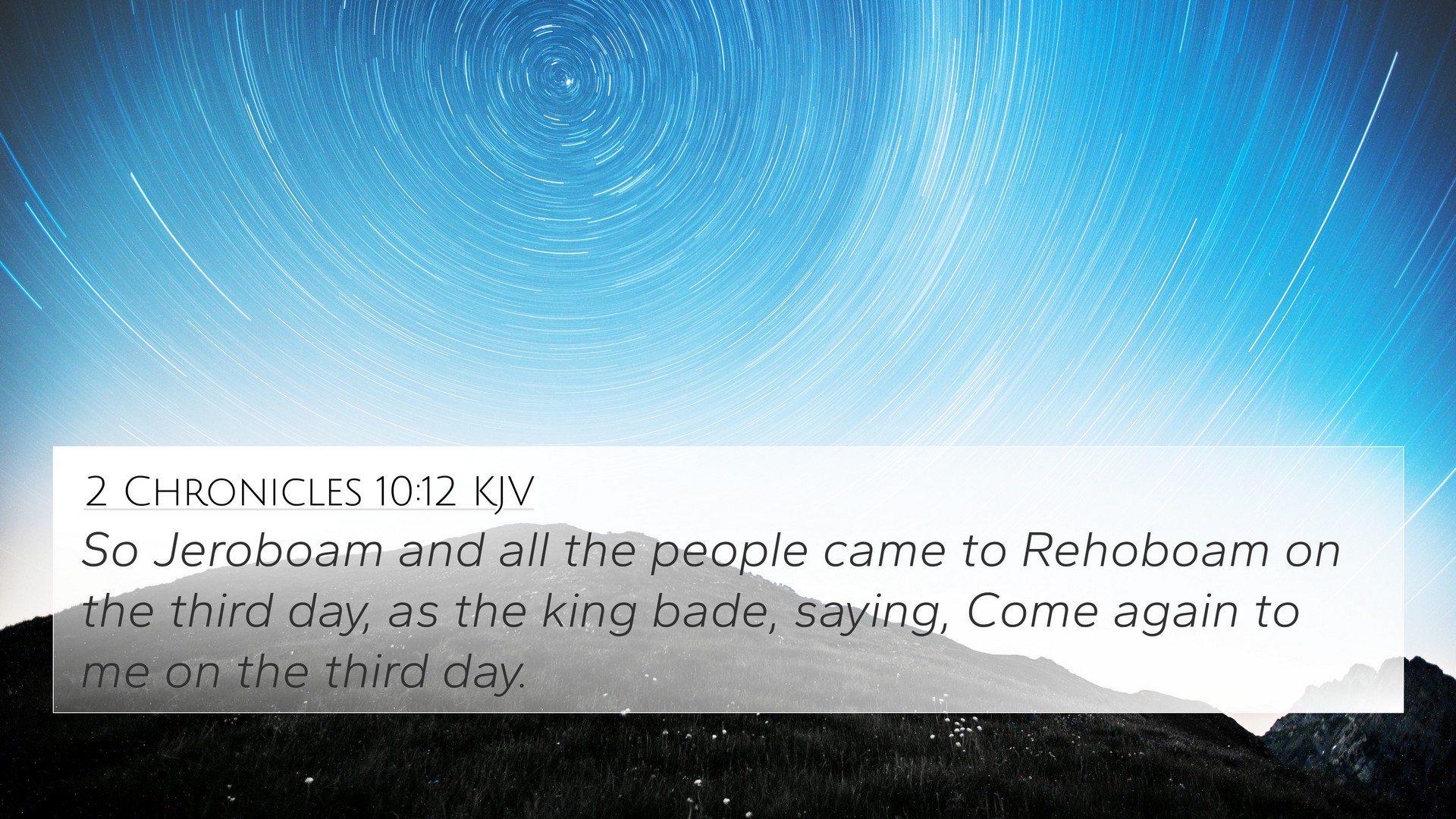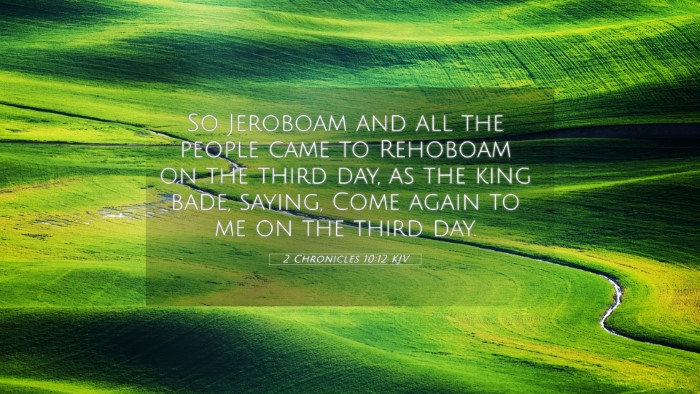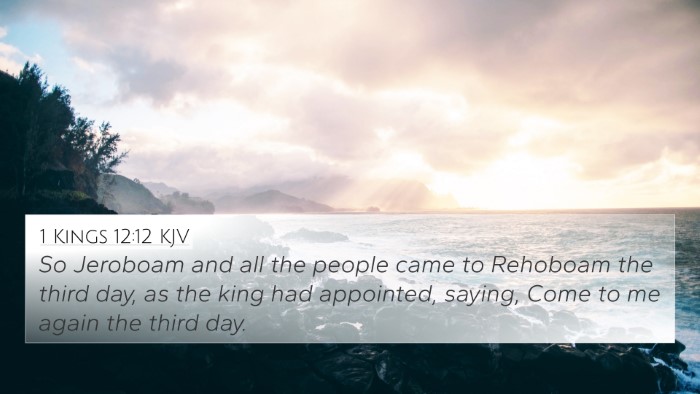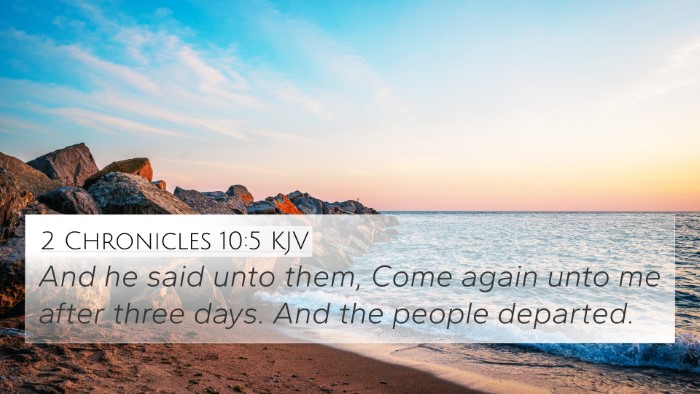Understanding 2 Chronicles 10:12
The verse 2 Chronicles 10:12 states:
“So Jeroboam and all the people came to Rehoboam the third day, as the king had appointed, saying, ‘Come again to me on the third day.’” (2 Chronicles 10:12, ESV)
Summary and Interpretation
This verse occurs during a pivotal moment in Israel's history when Jeroboam represents the northern tribes, seeking relief from the burdens placed upon them by King Solomon's rule. This moment holds significant weight as it sets the stage for the eventual division of the kingdom.
Key Themes
- The Weight of Leadership: Rehoboam, the son of Solomon, is faced with a delicate matter of leadership and governance. His decision will lead to the kingdom's division.
- Fulfillment of Promises: The third day mentioned symbolizes the fulfilling of a promise made by Rehoboam, showcasing both his authority and accountability.
- Conflict and Division: The gathering of the people signifies a pivotal moment of potential conflict, representing the growing discontent among the northern tribes.
Cross-References
This verse can be linked to several other scriptures that enhance its understanding and context:
- 1 Kings 12:1-2 - The initial assembly of Jeroboam and the people.
- 2 Chronicles 10:1 - The background for Jeroboam's request.
- 1 Kings 12:3-4 - The request made to Rehoboam about the yoke Solomon placed on them.
- Proverbs 11:14 - Acknowledges the importance of counsel in leadership.
- 2 Chronicles 10:8 - Rehoboam’s refusal to heed the wise counsel he received.
- Jeremiah 3:12-13 - Offers insight into God's relationship with Israel, highlighting themes of division.
- Ezekiel 37:15-23 - Foreshadows the reunification of the northern and southern kingdoms.
Commentary Insights
When we delve into the commentaries of renowned scholars, we gain a deeper understanding of this verse:
Matthew Henry's Commentary
Matthew Henry emphasizes the significance of Rehoboam's response to the people's plea for relief. He notes that the king's decision not only reflects his character but is also indicative of the consequences of ignoring wise counsel. The third-day meeting symbolizes hope yet foreshadows turmoil.
Albert Barnes' Notes on the Bible
Albert Barnes highlights the political implications of this gathering, framing it as a decisive moment that can lead either to unity or division. He explores the tensions that arise when a new ruler seeks to establish authority over a discontented populace, noting that Jeroboam's call for the people to return may also serve to rally them in solidarity against the king.
Adam Clarke's Commentary
Adam Clarke elaborates on the narrative's drama, showing that the third day appointed by Rehoboam stands as an important timeline in leadership. He stresses the idea that the upcoming response will have long-lasting implications for the kingdom, offering reflections on the gravity of leadership choices.
Thematic Connections
The themes present in 2 Chronicles 10:12 resonate throughout various books of the Bible. These connections provide a framework for understanding how leadership, wisdom, and conflict are treated in scripture:
- Leadership and Counsel: Proverbs 15:22 emphasizes the importance of seeking counsel in decision-making.
- Authority and Rebellion: 1 Samuel 8:7 reflects God's warning about the consequences of monarchy.
- Collective Action: Acts 15:25 demonstrates how crucial decisions are made when the body of believers gathers.
Tools for Understanding
For those seeking deeper insights, various tools can help dissect the layers of this and other verses:
- Bible Concordance: An essential resource for finding verses related to key terms in this passage.
- Bible Cross-Reference Guide: A comprehensive tool allowing for exploration of interconnected verses.
- Cross-Reference System: Utilize systems that provide cross-references for broader themes across scripture.
How to Use Bible Cross-References
Understanding how to effectively cross-reference can enhance study methods:
- Identify Key Themes: Look for common themes in passages to find connections.
- Explore Contextual Links: Compare historical and cultural contexts between verses.
- Utilize Study Bibles: Most modern study Bibles offer built-in cross-references, providing easy access to related scriptures.
Conclusion
The verse 2 Chronicles 10:12 provides a deep insight into the dynamics of leadership, the importance of wise counsel, and the potential consequences of decision-making within a community. By understanding the connections within scripture and using the right tools for cross-referencing, one can cultivate a richer comprehension of Biblical texts and their implications.




